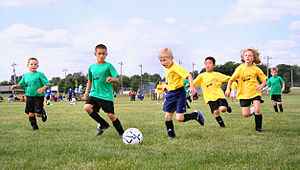Portal:Sports
The Sports Portal

Sport is a form of physical activity or game. Often competitive and organized, sports use, maintain, or improve physical ability and skills. They also provide enjoyment to participants and, in some cases, entertainment to spectators. Many sports exist, with different participant numbers, some are done by a single person with others being done by hundreds. Most sports take place either in teams or competing as individuals. Some sports allow a "tie" or "draw", in which there is no single winner; others provide tie-breaking methods to ensure one winner. A number of contests may be arranged in a tournament format, producing a champion. Many sports leagues make an annual champion by arranging games in a regular sports season, followed in some cases by playoffs.
Sport is generally recognised as system of activities based in physical athleticism or physical dexterity, with major competitions admitting only sports meeting this definition. Some organisations, such as the Council of Europe, preclude activities without any physical element from classification as sports. However, a number of competitive, but non-physical, activities claim recognition as mind sports. The International Olympic Committee who oversee the Olympic Games recognises both chess and bridge as sports. SportAccord, the international sports federation association, recognises five non-physical sports: bridge, chess, draughts, Go and xiangqi. However, they limit the number of mind games which can be admitted as sports. Sport is usually governed by a set of rules or customs, which serve to ensure fair competition. Winning can be determined by physical events such as scoring goals or crossing a line first. It can also be determined by judges who are scoring elements of the sporting performance, including objective or subjective measures such as technical performance or artistic impression. (Full article...)
Selected articles
Selected pictures
Did you know...
- ...that Leyton F.C. had to win a High Court action in order to call itself the oldest football club in London?
- ...that the Iowa Cornets made it to the Women's Professional Basketball League championship in both of its seasons in the league, and lost both times?
- ...that in 1994, Horace Dove-Edwin became the first medalist in athletics for Sierra Leone, but lost it due to a positive doping test?
- ...that Sabeena Saleem is the first mother to compete alongside her daughter at the Asian Games in Indian bowling history?
- ...that Jaime Navarro (pictured) was the opposing and winning pitcher for the inaugural Texas Rangers game at The Ballpark in Arlington in 1994?
Selected quote
Selected athlete
Neuner started biathlon when she was nine years old and won five junior world championship titles from 2004 to 2006. She made her World Cup debut in 2006 and won her first World Cup race in January 2007. One month later, she claimed three gold medals in her first appearance at the Biathlon World Championships. In the 2007–08 season, Neuner won the Overall World Cup and once more claimed three titles at the 2008 World Championships. After a less successful winter in 2008–09, she participated in her first Winter Olympic Games in 2010, winning the gold medal in both the pursuit and the mass start, and silver in the sprint race. Neuner also claimed the 2009–10 Overall World Cup title. At the 2011 World Championships, she won three more gold medals. In her final winter on the World Cup tour, Neuner won two more titles at the 2012 World Championships and claimed the Overall World Cup for a third time. Neuner was known as one of the fastest cross-country skiers in biathlon. She had been noted for her volatile shooting performances in the standing position, particularly in the early years of her career, often at the expense of better results.
Since winning three world championship gold medals in 2007, Neuner has become one of her home country's most popular female athletes. She was named German Sportswoman of the Year in 2007, 2011 and 2012. (Full article...)
Selected team
Rugby was introduced to France in 1872 by the British, and on New Year's Day 1906 the national side played its first Test match — against New Zealand in Paris. France played sporadically against the Home Nations until they joined them to form a Five Nations tournament (now the Six Nations Championship) in 1910. France also competed in the rugby competitions at early Summer Olympics, winning the gold medal in 1900 and two silver medals in the 1920s. The national team came of age during the 1950s and 1960s, winning their first Five Nations title outright in 1959. They won their first Grand Slam in 1968.
Since the inaugural World Cup in 1987, France have qualified for the knock-out stage of every tournament. They have reached the final three times, losing to the All Blacks in 1987 and 2011 and to Australia in 1999. France hosted the 2007 Rugby World Cup, where, as in 2003, they were beaten in the semi-finals by England.
French international matches are played at several venues across the country; the Stade de France in the Paris suburb of Saint-Denis is used for their games during the Six Nations, and they have a formidable home record at the Stade Vélodrome in Marseille where they have only lost twice, to Argentina in 2004 and to New Zealand in 2009. (Full article...)
In this month
- June 6, 1946 – The Basketball Association of America, a predecessor to the National Basketball Association, is founded
- June 14, 1900 – The only game of Basque pelota (pictured) ever played in the Olympics takes place at the 1900 Summer Olympics
- June 15, 1909 – The international governing body of cricket, the International Cricket Council, is founded
- June 20, 1904 – Fédération Internationale de l'Automobile, the federation in charge of Formula One and World Rally Championship, is founded
- June 23, 1894 – Pierre, Baron de Coubertin founds the International Olympic Committee, the organizers of the Olympic Games and Youth Olympic Games
Topics
Related portals
Categories
Things you can do
 |
Here are some tasks awaiting attention:
|
Associated Wikimedia
The following Wikimedia Foundation sister projects provide more on this subject:
-
Commons
Free media repository -
Wikibooks
Free textbooks and manuals -
Wikidata
Free knowledge base -
Wikinews
Free-content news -
Wikiquote
Collection of quotations -
Wikisource
Free-content library -
Wikiversity
Free learning tools -
Wiktionary
Dictionary and thesaurus

![Image 1 The 1876 association football match between the national teams representing Scotland and Wales took place on 25 March 1876 at Hamilton Crescent, Partick, the home ground of the West of Scotland Cricket Club. The match was the first game ever played by the Welsh side. It was also the first time than Scotland had played against a team other than England. The fixture[discuss] was organised by Llewelyn Kenrick, who had founded the Football Association of Wales (FAW) only a few weeks earlier in response to a letter published in The Field. Advertisements were placed in several sporting journals asking for Welsh players, or those with more than three years residence in the country, to come forward and the Welsh team was selected after trial matches were held at the Racecourse Ground in Wrexham. The FAW selected the side and Kenrick was appointed captain for the fixture. (Full article...)](http://upload.wikimedia.org/wikipedia/en/d/d2/Blank.png)


























































